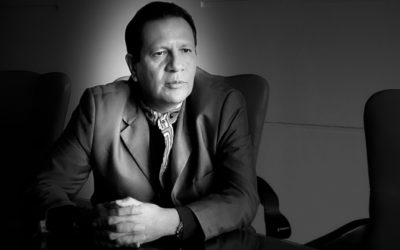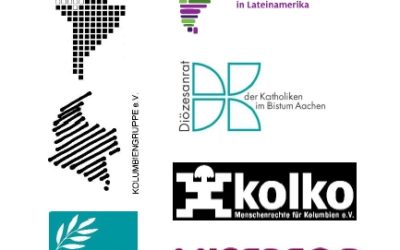JOINT STATEMENT – THE OBSERVATORY
International statement condemning attacks and threats against Afro-Colombian and indigenous leaders
Brussels, 13 May 2019
The European organisations and networks who have signed this statement reject the murder attempt against leaders from Afro-Colombian collectives from the Cauca department ACONC, PCN and ASOM and threats against the indigenous women’s organisation Wayúu Women’s Strength (Fuerza de Mujeres Wayúu), from the Guajira department.
On 5 May, leaders from the Association of Community Councils of Northern Cauca ( Asociación de Consejos Comunitarios del Norte del Cauca – ACONC), the Black Communities Process (Proceso de Comunidades Negras – PCN) and the Association of Women of African Descent from Northern Cauca (Asociación de mujeres afrodescendientes del Norte del Cauca – ASOM), were the victims of an attempted murder and massacre when guns and a grenade were fired in the village of Lomitas, in the municipality of Santander de Quilichao, Cauca department. The leaders of these Afro-Colombian social and grassroots organisations were attending a meeting to prepare dialogues with the Colombian Government related to the agreements with the Indigenous Demonstration, known as the Minga. In the attack several leaders were affected, including Francia Márquez (Goldman Award Winner, 2018), Víctor Hugo Moreno, Carlos Rosero, Clemencia Carabalí and Sofia Garzón, resulting in two men from the protection mechanisms being wounded. Subsequently, Mr. Moreno received an anonymous death threat on his phone in which he was informed that “what happened on Saturday is just the beginning, and it will end with the extermination of you all”.
Additionally, on 29 April and 9 May, several pamphlets were circulated, signed by the self-styled paramilitary group Águilas Negras – Bloque Capital D.C. and including threats and defamatory accusations against the indigenous women’s organisation Wayúu Women’s Strength (Fuerza de Mujeres Wayúu) and six of its members: Karmen Ramírez, Miguel Ramírez, Deris Paz, Luis Misael Socarras, Dulcy Cotes and Jakeline Romero. The Wayúu organisation carries out work in defence of land and the environment in relation to the mining company El Cerrejón, in the department of La Guajira.
Jakeline Romero, director of the organisation, has reported threats against her to the authorities since 2000, but the state response and protection measures have been insufficient to ensure the full protection of Ms. Romero and others from the organisation. In the last two years, Ms. Romero has participated in different European speaking tours including numerous meetings with European institutions, ministries of foreign affairs and a public event in the European Parliament.
It is of concern that killings and attacks against defenders and social leaders in the regions continue, without an adequate or sufficient response from the Colombian State, and that these particular attacks involve two human rights and environmental defenders with significant international recognition and support. Far from contributing to the construction of a sustainable and lasting peace, these events aim to silence the social movement, from the grassroots level to those with greater visibility and leadership at the national and international level.
It is also worrying that the attack took place in the middle of a preparatory meeting for dialogue with the government’s dialogue in the context of the Minga Nacional countrywide protests, during which smear campaigns and acts of defamation were promoted against the protest and its members. Social and human rights organisations have warned about the risk that these smear campaigns generate for people who participate in social protest activities.
These events are taking place in the context of an increase in violence and killings in Colombia against people who report human rights violations in Colombian regions. According to Colombian NGO the We Are Defenders Program (Programa Somos Defensores), 2018 was the most violent year for human rights defenders since the organisation started its register in 2009, with 805 acts of aggression, including 155 killings. The OHCHR 2018 annual report highlights in particular the vulnerability of indigenous and Afro-descendant leaders and of those who defend territorial and environmental rights. It should be noted that, in addition, the percentage of attacks against women defenders increased by 63.7% in 2018. The majority of these attacks remain in impunity while the Comprehensive Program of Guarantees for Women Leaders and Human Rights Defenders (Programa Integral de Garantías para las Mujeres Lideresas y Defensoras de Derechos Humanos), agreed between women’s organisations and the previous government, has not been implemented.
The measures foreseen in the Peace Agreement for the dismantling of paramilitary successor groups, such as the National Commission for Security Guarantees, the Special Unit in the Prosecutor’s Office, the Early Warning System and the Elite Police Corps, have not been implemented or only partially, or do not have enough political and financial support from the current government.
In light of this serious human rights crisis, the signatory organisations ask the international community to urge the Colombian authorities to:
1. Guarantee physical and psychological integrity and provide effective and comprehensive guarantees of individual and collective security for all the leaders and members of the organisations ACONC, ASOM, PCN and Fuerza de Mujeres Wayúu, as well as for all people who work for peace and co-existence in the country.
2. Carry out immediately a thorough and impartial investigation into the attacks and threats to clarify the facts, identify not only the material authors – last weak one presumably material author was captured by authorities, but also the intellectual authors responsible, and bring them to justice.
3. Prioritise work to dismantle the criminal structures that are behind these attacks and threats, especially paramilitary successor groups, responsible for the majority of attacks.
4. Resume dialogue with human rights organisations as part of the National Guarantees Process, for the construction of a protection policy with a differential approach, including progress made in this process with previous governments, and to move forward the investigations into threats against and killings of human rights defenders.
5. Make progress in implementing collective protection measures and protection measures for human rights defenders in rural areas, as included in the Peace Agreement, with the participation of organisations and communities, respecting existing self-protection mechanisms, and with a gender and ethnic perspective.
In addition, and in compliance with the European Guidelines for Defenders, we request that the International Community visit the territories and offices of the organisations of those who have been attacked and threatened, as well as publicly and forcefully rejecting the actions against them.
Signatories:
International Office for Human Rights – Action on Colombia OIDHACO (European and international organizations platform)
World Organization Against Torture (OMCT), in the framework of the Observatory for the Protection of Human Rights Defenders.
FIDH, in the framework of the Observatory for the Protection of Human Rights Defenders.
Protection International (International)
Broederlijk Delen VZM (Belgium)
Catapa (Belgium)
Comité pour le respect des droits humains „Daniel Gillard“ (Belgium)
Solsoc (Belgium)
ACAT – Action des chrétiens pour l’abolition de la torture (France)
Kolko – Menschenrechte für Kolumbien (Germany)
Misereor (Germany)
AlterNativa Intercanvi amb Pobles Indígenes (Spanish State)
Atelier (Spanish State)
Colectivo Maloka (Spanish State)
Confederación Sindical de Comisiones Obreras (Spanish State)
Cooperacció (Spanish State)
Enginyeria Sense Fronteres (Spanish State)
Institut de Drets Humans de Catalunya (Spanish State)
Mujeres Pal’ante (Spanish State)
Taula Catalana por la Paz y los Derechos Humanos en Colombia (Spanish State):
Ajuntament de Lleida
Assemblea de Cooperació per la Pau
Associació Catalana per la Pau
Comissió Catalana d’Ajuda al Refugiat
Consell Nacional de la Joventut de Catalunya
Cooperacció
Entrepobles
Fons Català de Cooperació al Desenvolupament
Foro Internacional de Víctimas
Fundación Indera
Fundació Pau i Solidaritat – CCOO Catalunya
FundiPau
Intersindical-CSC
Justícia i Pau
La Colectiva. Mujeres refugiadas, exiliadas y migradas de Colombia en España
La f.agrave;bric@
LaFede.cat
Lliga dels Drets dels Pobles
Moviment per la Pau – MPDL
Mujer Diáspora
Nabowa – Xarxa per la Pau
Oxfam Intermón
Plataforma Unitària Contra les Violències de Gènere
Sindicalistes Solidaris – UGT
Soldepaz Pachakuti (Spanish State)
Mundubat (Spanish State)
SweFOR – The Swedish Fellowship of Reconciliation (Sweden)
Ask! Arbeitsgruppe Schweiz-Kolumbien (Switzerland)
Kolumbien-Plattform Schweiz (Switzerland)
Colombian Caravana (United Kingdom)
Christian Aid (United Kingdom)
For further information please contact Jorge Gómez, Oidhaco Coordinator , oidhaco@oidhaco.org, tel.+32 2 5361913
Download full statement:



